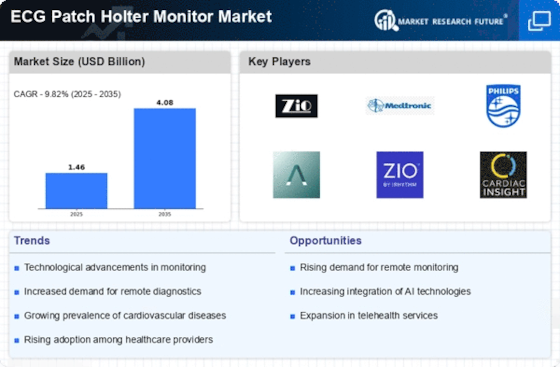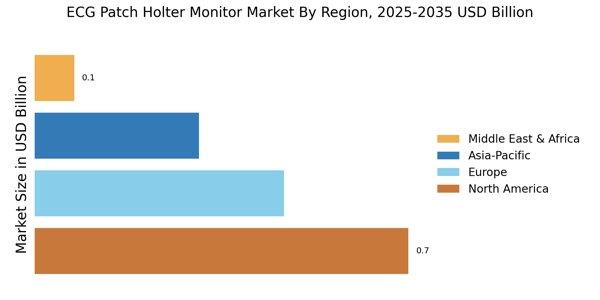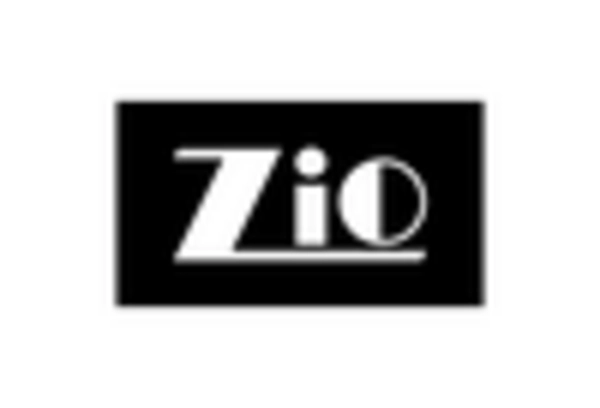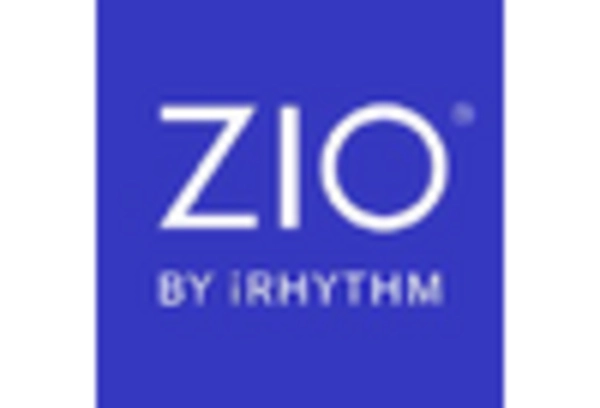Rising Incidence of Cardiovascular Diseases
The ECG Patch Holter Monitor Market is significantly impacted by the rising incidence of cardiovascular diseases worldwide. As lifestyle-related factors such as poor diet, lack of exercise, and increased stress levels contribute to heart-related issues, the demand for effective monitoring solutions is escalating. Statistics indicate that cardiovascular diseases account for nearly 31% of all global deaths, underscoring the urgent need for early detection and management. ECG patches offer a non-invasive and efficient means of monitoring heart activity, making them an attractive option for both patients and healthcare providers. This alarming trend in cardiovascular health is likely to drive the growth of the ECG Patch Holter Monitor Market, as more individuals seek proactive solutions to manage their heart health.
Regulatory Support and Reimbursement Policies
The ECG Patch Holter Monitor Market is also influenced by favorable regulatory support and reimbursement policies. Governments and health authorities are increasingly recognizing the value of remote monitoring technologies in improving patient care and reducing healthcare costs. As a result, there has been a push for policies that facilitate the reimbursement of ECG patch monitoring services. This regulatory environment encourages healthcare providers to adopt these technologies, knowing that they will be compensated for their use. Furthermore, the establishment of clear guidelines for the use of ECG patches in clinical settings is likely to enhance their credibility and acceptance among healthcare professionals. This supportive framework is expected to contribute positively to the growth trajectory of the ECG Patch Holter Monitor Market.
Increased Demand for Remote Monitoring Solutions
The ECG Patch Holter Monitor Market is witnessing a notable increase in demand for remote monitoring solutions. This trend is largely driven by the need for continuous patient monitoring, especially among individuals with chronic cardiovascular conditions. The convenience of wearing a patch that transmits data wirelessly to healthcare providers is appealing to both patients and clinicians. According to recent estimates, the remote patient monitoring market is expected to reach USD 2 billion by 2026, with ECG patches playing a pivotal role in this growth. This shift towards remote monitoring not only enhances patient engagement but also reduces hospital visits, thereby alleviating the burden on healthcare systems. Consequently, the ECG Patch Holter Monitor Market is poised for significant expansion as healthcare providers increasingly adopt these technologies.
Growing Consumer Awareness and Health Consciousness
The ECG Patch Holter Monitor Market is benefiting from a growing consumer awareness regarding heart health and the importance of early detection of cardiovascular diseases. As individuals become more health-conscious, there is a rising demand for accessible and user-friendly monitoring devices. Educational campaigns and health initiatives are contributing to this trend, encouraging people to take proactive measures in managing their heart health. Market Research Future indicates that approximately 60% of consumers are now more inclined to utilize wearable health technologies, including ECG patches, to monitor their cardiovascular status. This heightened awareness is likely to drive the adoption of ECG patch monitors, further propelling the market's growth in the coming years.
Technological Advancements in ECG Patch Holter Monitor Market
The ECG Patch Holter Monitor Market is experiencing a surge in technological advancements that enhance the accuracy and efficiency of cardiac monitoring. Innovations such as wireless connectivity, improved battery life, and advanced algorithms for data analysis are becoming increasingly prevalent. These developments not only facilitate real-time monitoring but also enable healthcare providers to access patient data remotely, thus improving patient outcomes. The integration of artificial intelligence and machine learning into ECG patch technology is also noteworthy, as it allows for predictive analytics and personalized treatment plans. As a result, the market is projected to grow at a compound annual growth rate (CAGR) of approximately 10% over the next five years, indicating a robust demand for these advanced monitoring solutions.

















